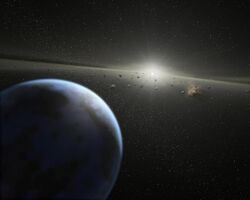Astronomy:HD 69830 c
From HandWiki
Short description: Neptunian-sized planet orbiting HD 69830
 HD 69830 c | |
| Discovery | |
|---|---|
| Discovered by | C. Lovis et al.[1] |
| Discovery date | May 18, 2006 |
| Radial velocity | |
| Orbital characteristics | |
| 0.181 ± 0.004 AU (27,080,000 ± 600,000 km) | |
| Eccentricity | 0.03±0.027[2] |
| Orbital period | 31.6158±0.0051 d[2] |
| astron|astron|helion}} | 2,453,469.6 ± 2.8 |
| 221 ± 35 | |
| Semi-amplitude | 2.6±0.1 m/s[2] |
| Star | HD 69830 |
| Physical characteristics | |
| Mass | ≥12.09+0.55 −0.54 M⊕[2] |
| Physics | ~522 K |
HD 69830 c is an exoplanet orbiting HD 69830. It is the second-closest planet in its system and has a minimum mass 12 times that of Earth. Based on theoretical modeling in the 2006 discovery paper, it is likely to be a rocky planet, not a gas giant.[1] However, other work has found that if it had formed as a gas giant, it would have stayed that way,[3] and it is now understood that planets this massive are rarely rocky.[4]
References
- ↑ 1.0 1.1 Lovis, Christophe et al. (2006). "An extrasolar planetary system with three Neptune-mass planets". Nature 441 (7091): 305–309. doi:10.1038/nature04828. PMID 16710412. Bibcode: 2006Natur.441..305L. http://obswww.unige.ch/~pernier/publications-www/articles-pdf-ps/2006Natur.441..305L.pdf. Retrieved 2013-11-22.
- ↑ 2.0 2.1 2.2 2.3 Laliotis, Katherine et al. (February 2023). "Doppler Constraints on Planetary Companions to Nearby Sun-like Stars: An Archival Radial Velocity Survey of Southern Targets for Proposed NASA Direct Imaging Missions". The Astronomical Journal 165 (4): 176. doi:10.3847/1538-3881/acc067. Bibcode: 2023AJ....165..176L.
- ↑ H. Lammer (2007). "The impact of nonthermal loss processes on planet masses from Neptunes to Jupiters". Geophysical Research Abstracts 9 (7850). http://www.cosis.net/abstracts/EGU2007/07850/EGU2007-J-07850.pdf?PHPSESSID=1eb3a7a98603083dda25d18001ea2a33.
- ↑ Chen, Jingjing; Kipping, David (2017). "Probabilistic Forecasting of the Masses and Radii of Other Worlds". The Astrophysical Journal 834 (1): 17. doi:10.3847/1538-4357/834/1/17. Bibcode: 2017ApJ...834...17C.
Coordinates: ![]() 08h 18m 23.9s, −12° 37′ 55.8″
08h 18m 23.9s, −12° 37′ 55.8″
 |

